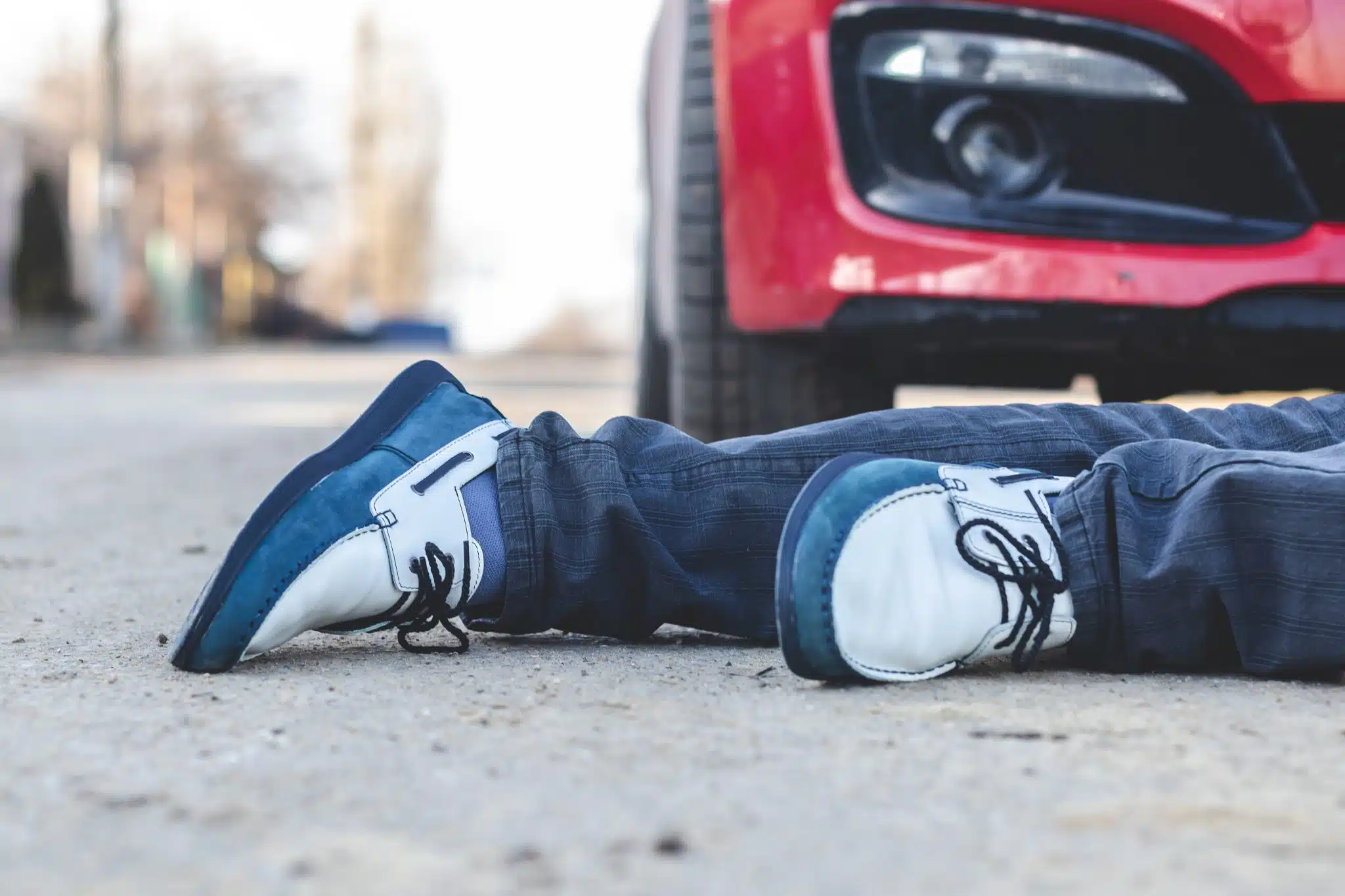
Car accidents are always frightening, but when your head takes the impact, the situation can become far more serious. Head injuries can affect your ability to think clearly, work, and even enjoy daily life. You might feel fine at first, only to have symptoms appear days later.
The moments after a crash are often chaotic. It’s easy to overlook a headache or wave off a sense of fogginess, but ignoring the signs of a head injury can put your recovery at risk. Making sure you receive medical attention for your head injury, no matter how mild it may seem, is top priority. If a negligent driver caused your car accident, consulting with an experienced car accident lawyer near you is the best next step.
Whether you're dealing with a concussion or something more serious, understanding the process ahead of you can help you make informed decisions during a time that’s often filled with confusion and uncertainty.
What should you do after hitting your head in a car accident?
Hitting your head in a car crash can lead to serious complications—even if you feel okay at first. Here’s what to do next:
- Get medical attention immediately: Head injuries like concussions or TBIs often have delayed symptoms.
- Document your symptoms: Track headaches, confusion, vision issues, or mood changes daily.
- Consult a car accident lawyer: Legal help ensures your injuries are documented and you get fair compensation.
- Avoid insurance traps: Don’t give statements or accept quick settlements without legal advice.
- Claim full compensation: You may be entitled to medical costs, pain and suffering, lost income, and more.
Head Injuries from Car Accidents Can Be Serious—Even If They Don’t Seem Like It
After a crash, it’s easy to overlook a head injury, especially if you don’t lose consciousness or feel immediate pain. But the truth is, even a minor jolt can cause a traumatic brain injury (TBI). You may feel dazed or “off,” or you might develop symptoms later that interfere with memory, balance, or mood.
Your brain is sensitive. And if another driver’s carelessness caused your injury, you shouldn’t have to bear the consequences alone. The sooner you act, the better your chances of protecting your health, your legal claim, and your future.
What to Do Immediately After Hitting Your Head
In the moments and days after a crash, you may be overwhelmed. But knowing what steps to take now can make all the difference in your recovery, both physically and financially.
Seek medical attention right away
Even if you feel okay, go to a doctor immediately. Head injuries often don’t show symptoms until hours or even days after the accident. Conditions like concussions, hemorrhages, skull fractures, and traumatic brain injury can worsen quickly without treatment.
Medical care also creates a formal record of your injury. This documentation is key to proving your injuries later in a personal injury claim. If you're diagnosed with a brain injury, your attorney can use this record to link your symptoms directly to the crash.
Document your symptoms from the start
Start a journal. Write or video record descriptions of headaches, confusion, dizziness, vision problems, mood swings, or trouble concentrating. These are all common signs of a traumatic brain injury, and tracking them daily can help both your medical team and your legal team understand what you’re experiencing.
Additionally, take photographs if there are visible injuries, such as swelling, bruising, or cuts to your head or face. These images could support your case by showing the severity of your condition immediately after the crash.
After speaking with a lawyer, report the accident
Once you’ve consulted with an attorney, make sure the accident is officially reported. A police report creates a neutral, third-party record of what happened. It can include valuable details like:
- Who was involved
- Witness statements
- Diagram of the accident scene
- Officer’s observations
Without a police report, it’s harder to prove that the other driver was responsible. And without legal guidance, you may unintentionally say something that could hurt your claim.
Avoid discussing fault or injuries with the other driver, or the insurance company
Don’t apologize. Don’t speculate. And don’t agree to give a statement to the other party’s insurance company without legal advice. Even casual remarks like “I’m okay” or “I didn’t see you” could be twisted to suggest you were at fault.
Common Types of Head Injuries After Car Accidents
Car crashes are one of the top causes of traumatic brain injury in the U.S. Every car crash has different consequences, but certain head injuries are especially common in motor vehicle accidents. These can range in severity, and all deserve medical attention.
Concussions
A concussion is often described as a “mild” traumatic brain injury. It is usually caused when the brain hits the inside of the skull during an impact. Concussion symptoms may include headaches, dizziness, confusion, nausea, and sensitivity to light or noise. Some people also experience emotional changes or sleep disturbances.
Even though concussions are considered a mild form of TBI, their effects can be serious and long-lasting. In some cases, post-concussion syndrome may persist for weeks or months.
Skull fractures
A hard impact can fracture the bones of the skull. These fractures are extremely dangerous if they involve bleeding, brain swelling, or pressure on brain tissue. Immediate emergency treatment is often required. Skull fractures can also increase the risk of infections and long-term complications.
Contusions and hematomas
A brain contusion is essentially a bruise on the brain tissue. Hematomas, or blood clots, can form between the brain and skull. Both can be life-threatening if they put pressure on the brain or cut off oxygen flow. These injuries may require surgery or intensive care.
Diffuse axonal injuries
These serious brain injuries involve the tearing of nerve fibers and usually occur when the head moves violently during a crash. People with this type of injury often lose consciousness at the scene and may enter a coma. Recovery is long and uncertain, and typically involves extensive rehab.
Why Medical Documentation Is Key to Your Legal Case
In personal injury law, your medical records are more than just health documents—they are legal evidence. If you're pursuing a claim, this documentation can show:
- The exact nature of your injury
- When and how it happened
- The treatments you’ve received
- The potential for long-term complications
Strong documentation supports your claim for compensation
Insurance companies often look for ways to downplay injuries. If there are gaps in your medical treatment, or if you wait too long to see a doctor, they may argue your injuries aren’t serious or weren’t caused by the accident. That’s why consistent care and detailed records are so important.
Your records help estimate future damages
If your head injury affects your ability to work or care for yourself in the future, your lawyer may pursue compensation for future medical costs and lost earning potential. This requires expert medical opinions, supported by your ongoing treatment notes and test results.
Dealing With Insurance Companies After a Head Injury
Unfortunately, many car accident victims trust that insurance companies will do the right thing and pay them fairly for their injuries and resulting damages. However, insurance adjusters are only going to protect their company’s interests, not yours. They will attempt to settle your claim as quickly and as cheaply as possible. This is especially true with head injury claims, where long-term symptoms may not show up right away.
To minimize your payout, insurance companies may:
- Offer a low settlement quickly to avoid future claims
- Question the severity of your injury
- Argue that your symptoms are pre-existing
- Request a recorded statement to use against you
You should never deal with these companies on your own. Your attorney can handle communications and negotiations, making sure your injury is taken seriously and your compensation reflects the full impact of your condition.
How a Car Accident Lawyer Can Help After a Head Injury
When you’ve suffered a head injury in a crash, working with an experienced personal injury lawyer can make a significant difference in the outcome of your case. Some of the major responsibilities a lawyer takes on when they accept your case are:
Investigating the accident thoroughly
A lawyer will launch an independent investigation into the crash, using accident reconstruction experts, witness interviews, traffic camera footage, and vehicle damage reports to build a strong case. The goal is to identify all liable parties and preserve every piece of crucial evidence.
Proving liability and linking it to your injury
In head injury cases, proving that the accident caused your medical condition is critical. A personal injury attorney will gather medical records, consult with neurologists, and use your treatment history to create a clear link between the collision and your symptoms.
Negotiating fair compensation
Insurance companies make settlement offers that don’t come close to covering long-term costs. A lawyer can calculate the true value of your damages, including medical bills, future treatment, lost income, and pain and suffering, and push for a resolution that reflects the full impact of your injury.
Working with a car accident lawyer who is also experienced in the courtroom can also help maximize your recovery. If the insurer won’t agree to a fair settlement, a trial lawyer can file a personal injury lawsuit and represent you in court.
Long-Term Effects of Head Injuries You Should Not Ignore
Unlike broken bones or bruises, the effects of a brain injury may not be visible, but they can change your life forever. Some people recover fully. Others deal with lasting cognitive, emotional, and physical impairments.
Cognitive changes
You may find it harder to concentrate, remember things, or process information. Everyday tasks can become frustrating or even dangerous, like forgetting to turn off the stove or getting lost in a familiar place.
Emotional and psychological symptoms
Head injuries can trigger mood swings, anxiety, depression, irritability, or a lack of impulse control. These changes can strain relationships and reduce your quality of life, even if the injury itself isn’t classified as “severe.”
Physical symptoms
Balance problems, chronic headaches, dizziness, and sensitivity to light or sound are all common. In more serious cases, a TBI can affect motor skills, coordination, or speech.
Loss of income and career impact
If your job requires focus, memory, or physical coordination, even a moderate brain injury may make it difficult—or impossible—to return to work. Your lawyer will account for lost wages and future earning potential when building your case.
Compensation You May Be Entitled To After a Head Injury
Every case is different, but victims of car accident head injuries may be eligible for several types of compensation.
Medical expenses (past and future)
You can recover the full cost of emergency care, hospital stays, imaging scans, surgery, medications, physical therapy, neurological care, and long-term rehabilitation. If your injury requires ongoing treatment, your lawyer will work with medical experts to estimate future costs.
Pain and suffering
The emotional distress and physical discomfort caused by a head injury can be profound. While these damages aren’t always easy to measure, they are a valid and important part of your claim. An attorney can help quantify this impact using testimony, medical evaluations, and daily life disruptions.
Lost income and diminished earning capacity
If your injury forces you to take time off work—or prevents you from returning to your previous job—you may be entitled to compensation for lost income, missed promotions, and future earning losses.
Loss of enjoyment of life
When a brain injury robs you of your independence, hobbies, or relationships, the law allows you to seek damages for this loss of enjoyment. This is especially relevant in cases involving permanent disability or long-term cognitive impairment.
Punitive damages (in rare cases)
If the at-fault driver acted with extreme negligence, such as drunk or reckless driving, you may be awarded punitive damages to punish that behavior. These are rare but can significantly increase the value of your case.
What Not to Do After a Head Injury in a Car Crash
Sometimes, what you don’t do after an accident is just as important as what you do. Here are a few key mistakes that can hurt your health—and your legal claim.
Don’t delay medical treatment
Waiting to see a doctor could put your health at risk and create gaps in your medical record. Insurance companies will use that delay to argue that your injuries weren’t serious or weren’t caused by the accident.
Don’t speak to the other party’s insurance company
Even if they sound friendly, adjusters are trained to find ways to reduce payouts. Never agree to a recorded statement or accept a settlement without speaking to your lawyer first.
Photos, comments, or updates about your accident or recovery could be used against you in court. Keep your personal injury case private until it’s resolved.
Don’t downplay your symptoms
Be honest with your medical providers and your attorney. Downplaying your symptoms to “tough it out” could make it harder to get the care and compensation you need.
Frequently Asked Questions
How long do I have to file a personal injury claim after hitting my head?
The time limit—called the statute of limitations—varies by state, but most allow two to three years from the date of the accident. However, some exceptions apply, especially in cases involving government vehicles or minors. Speak to a lawyer right away to protect your rights.
What if I’m partially at fault for the crash?
Even if you were partly responsible, you may still be able to recover compensation. Many states use comparative negligence laws, which allow you to recover a portion of your damages based on your level of fault. Your lawyer can explain how this might affect your claim.
How much does it cost to hire a car accident lawyer?
Seek a personal injury attorney who works on a contingency fee basis. That means you pay nothing upfront, and they only get paid if they recover compensation for you. A contingency also aligns your lawyer’s interests with your own, as their pay comes as a percentage of your total recovery. Your consultation should also be free and confidential.
Contact The Rothenberg Law Firm LLP Today
Head injuries can leave you feeling confused, scared, and unsure of what comes next. But you don’t have to go through this alone. For over 50 years, The Rothenberg Law Firm LLP has helped injury victims across the country seek justice and rebuild their lives after devastating accidents.
We’re here to listen. We’re here to fight for you. And we don’t back down when it comes to getting our clients the compensation they deserve.
Call us today at 1-800-624-8888 or reach out through our contact form for a free consultation. If we take your case, it’s because we believe in it, and we’ll do everything we can to secure the best possible results for you.
Call for Legal Help 1-800-624-8888



